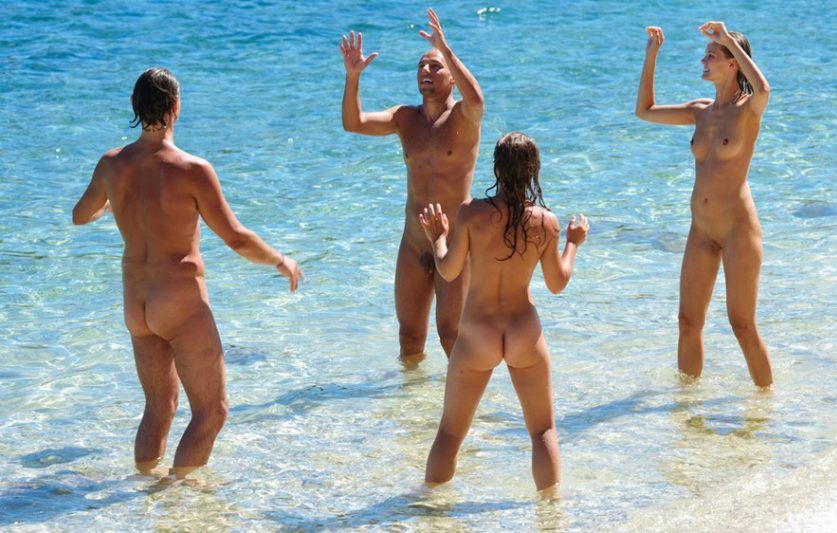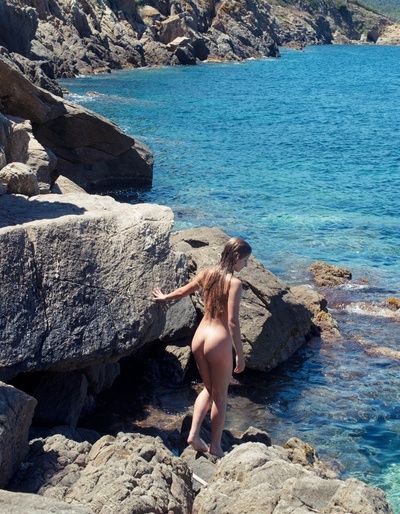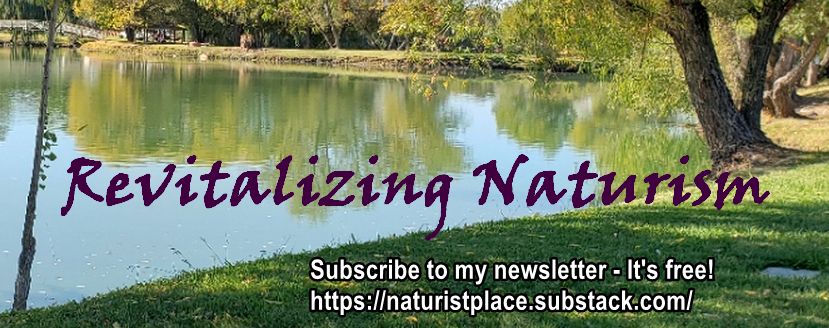
Among the articles on naturism that appeared in July 2020, there were two that have implications far outside the naturist sphere. So I’ll deal with them together in order to clearly make a point. That is: Naturists should promote their favorite pastime not only for its own goodness but also for its benefits to the whole economy.
- The untold story of Yugoslavia’s naturist paradise
Yugoslavia actually existed as a single country only between the end of World War I in 1918 and the gradual dissolution of the Soviet Union in the early 1990s. Before 1918 the area that became Yugoslavia comprised several territories of the former Austro-Hungarian empire – the Slovenes (in the north), Croats (in the middle), and Serbs (in the south). Although these areas were ethnically diverse, related Slavic languages were a common bond. Because of linguistic relations with Russia, politics in the region had affinities with socialism/communism, unlike the more Western countries of Europe. (See the Wikipedia article for the complicated details.)According to the article cited here, naturism – from France and Germany – became popular in the area that is now Croatia:
“Clothes-free tourism was one of the many things that made Yugoslav communism rather different to the model then offered by the Soviet bloc. Throughout the 70s and 80s, Yugoslavia was one of the biggest nudist destinations in the world. Koversada, which could accommodate 10,000 guests at its peak, was just one part of a coastal resort archipelago that attracted an estimated one million naturists a year.”There were various reasons for naturism’s success in Croatia, especially in the Istrian peninsula. Perhaps most importantly, Croatia had by far the largest amount of coastline on the Adriatic compared to other regions of Yugoslavia. Besides that, there was the predominance of Christian/Catholic religion – in contrast to the stronger body-negativity of Muslim regions to the south. Under Marshal Josef Tito, after World War II, the country as a whole wanted to distance itself, culturally as well as politically, from Soviet Russia. Tito, the country’s dictator from 1945 to 1980, proved to be a more benevolent leader than most others in the puritanical Soviet sphere. The ability to attract Western tourists – including naturists – was certainly helpful for the country’s economy. Unfortunately, in the puritanical U. S., most states haven’t yet understood the economic value of naturist tourism.
Interestingly, even though Catholicism wasn’t quite as hostile to nudity as Islamic religion, it was still pretty hostile. And, ironically enough, this hostility drove would-be naturists from Italy and southern Germany to another Catholic – but communist – region where nudity was better tolerated and could be enjoyed more freely.
The outlook for naturism in Croatia today is less bright than in its peak days. There’s more competition, for one thing, from southern Spain and France, and even places farther afield, such as Thailand and the Caribbean. More seriously, perhaps, the ever-increasing plague of income inequality around the world means there are fewer lower-income naturists who can afford to travel even to relatively no-frills camping areas, like those of Croatia in the 70s and 80s. And at the affluent end, tourists now seem to crave luxury or (at least) “glamping” – with or without nudity. The need for comfortable but unpretentious and affordable places to enjoy nudity close to where one lives is as great as ever – but economics is working against that possibility.
For more on contemporary Croatian naturism, see this post.
- The Market Will Bare It: Transnational Nude Tourism

Here’s another article on naturist history – this time in France, just after World War II. It’s summarized in the subtitle: “As Europeans recovered from the devastation of World War II, nude beaches appeared in France.”Once again we have a case that clearly indicates how the combination of naturism and tourism can be of great value to a distressed local or regional economy. If all the economically struggling parts of the U. S. (and many other countries) could just get over their prejudices against nudity based on irrational religious and cultural factors, they could also enjoy significant economic benefits. An example from Florida of local economic incentives for supporting naturism was given here.
Just imagine the results if a U. S. state, like West Virginia or Kentucky, could leverage their areas of considerable natural beauty to replace obsolete and never-reviving industries like coal mining. Attractive new naturist campgrounds and resorts could draw naturists from elsewhere to spend money in the state – without polluting the local environment. Unlike in wealthier states, land in such places is cheap and ready to be put to better use. There are great benefits for naturism, as well, if this happened. Most of the naturist campgrounds and resorts in the U. S. have been around for many years, haven’t been maintained and upgraded as well as they could be, and often lack facilities that could attract a younger generation of naturists.
At present, Kentucky has no landed naturist facilities. West Virginia has one fine facility – Avalon Resort, in Paw Paw, WV – but it’s in the extreme north-east corner, distant from most of the state. Paw Paw is a 4-hour drive from Charleston, WV in the western part of the state, so it’s much closer to Pittsburgh, Baltimore, and Washington DC. As a result, Avalon doesn’t help much in attracting naturist tourists further west.
But back to the article cited here, which begins:
“After World War II, nudism took off in France as an economic development strategy. Tourists from all over Europe came to the French Riviera to sunbathe in the buff, spending their money and invigorating local economies laid waste by the war. While nudity on beaches wasn’t legal in France until the late 1960s and early 1970s, local authorities tolerated it from the late 1940s onward because it drew tourists and their spending power. The Ile du Levant, an island off the French Riviera, was the first place to take advantage of the opportunity. “Economists confirm that the Ile du Levant, where precious currencies converge, can greatly aid the recovery of the franc.” So said an October 1952 issue of La France, quoted by historian Stephen L. Harp in his examination of this curious intersection of nudism and economics.”The article by Stephen Harp linked just above is a long (31 pages) academic paper, which can be read online. It chronicles the history of the Ile du Levant in the decades after World War II. Most experienced naturists have probably heard of the place, although it’s no longer nearly the most popular naturist destination in France. (The picture just above is from the Ile.) Hart quotes a journalist who wrote in 1952: “the delights of Héliopolis … are now known throughout the world. In the summer that just ended, 30,000 nudists people the island that was once so quiet. They spoke all languages, and particularly German. … Economists confirm that the Ile du Levant, where precious currencies converge, can greatly aid the recovery of the franc.”
Naturism in the U. S. is suffering from a lack of both younger visitors and more modern campgrounds and resorts. External factors such as high technology and the need to replace industries that are harmful to the environment and the climate with much more environment/climate-friendly industries are steadily eroding older employment opportunities. These factors are inevitable but detrimental to the overall economy, at least in the short term. As the examples of Croatia and France show, encouragement of naturism could have benefits all around. It’s really up to naturists to make this connection better understood by everyone.

Thanks for your excellent blog, and especially this post. It’s worth noting that the Stephen Harp article is actually an excerpt from his book on the whole topic, the goes on to explain how the Ile du Levant crowd eventually moved to the mainland when Cap d’Agde was born. Unfortunately, they found that not only was naturism a huge draw, but so was the casual sex industry, which remains a vivid and controversial part of the Cap d’Agde profile. That’s probably significant here, as I think most Americans are already concerned that nudist places are thinly disguised swinger places.
In the meantime, Ile du Levant remains one of our favorite naturist destinations. It may not be the boom-town of the postwar era, but there are lovely hotels, camping, restaurants and great trails along the sea. Few Americans seem to know about it, but we think it’s one of the crown jewels of naturism.
Thanks again for your work on this piece. Great recap on the Yugoslavia story as well. Probably helps that you can drive from Munich to Koversada in about six hours. So many naked Germans. LOL 🙂
Thanks for the information, Dan. Do you think that the confusion of naturist places with the “casual sex industry” is as widespread in Europe as it is in the U. S.? I can see how many people would go to Cap d’Adge for reasons of both sex and naturism. So the confusion is baked in. But there are also naturists who go just for the naturist side, and know how to steer clear of the rest. In the U. S. there are probably many people who’ve never heard of Cap d’Agde. The confusion of sex with naturism is so widespread in the U. S. probably because most people really know nothing about naturism – and don’t want to. Just as with so many other things.
Have you written about your visits to the Ile du Levant and Croatian places on your blog?
Hey there! Thanks for the quick reply.
There are a couple things at play here. First of all, I would say French people are simply more sex positive in general. (Though that has been changing in recent years with the increased Muslim population, and the general trend toward greater conservatism among French people.) But parents are still more likely to be forthright about sexuality, let alone nudity, with their children. For that matter, there are very few Europeans who get married at 19 years old so they can have sex without offending their parents or the church. A totally different value system.
I brought up Cap d’Agde as that is the first place I’m typically asked about (if people thin to ask anything at all) when I tell people we take nakations in France. Cap d’Agde is a huge place, and there is most certainly something there for everyone. It’s not uncommon to see families with young children on the beach, but wander a 100 meters DOWN the beach, especially late in the day, and you’re likely to encounter just about anything sexual you can imagine. (Not to mention all the sketchy swingers clubs in town.) THAT IS NOT THE NORM AT EUROPEAN NATURIST PLACES!!! I’ve heard about other beaches in Spain that can get edgy, but MOST naturist places in France, Spain, and Croatia have very clear guidelines about what is or is not acceptable, and at most, the family friendly environment is most pervasive.
I think the biggest issue in the US is that naturism (nudism) lives so far out on the margin of social acceptance that it’s very difficult to sustain the business model without catering to the swinger crowd. We (my wife and I) have nothing against people who are seeking that kind of enjoyment, but it’s not our thing, and more importantly, that immediately sends off all the bells and whistles about having children around, with more and more places simply setting an “adults only” policy, even if they don’t allow public displays of affection. Americans are simply too paranoid about taking their children along with a chance of encountering something uncomfortable. And quite frankly, as the population at nudist places ages, many of the regulars are happy not having kids around.
I’ve written quite a lot about Croatia and Ile du Levant, and in fact, I’m working on an update on Croatia tonight. If you simply scroll down the right margin of my blog, you’ll find a search bar. Type in “Croatia” or “Ile du Levant” and it’ll take you right there.
Again… keep up the great work on the blog. You’ve become one of my “go-to” resources. 🙂
Very nice article. As a resident of Kentucky I agree that naturalism tourism would be a benefit here. However, our draconian state laws with regard to such a thing make it impossible (property must be completely fenced off, a membership roster must be provided to the local sheriff’s office…) to even try and establish such a place.
I wrote to a few legislators about easing the restrictions and was met with a blast of over the top outrage and branded a deviant, pervert, and all but accused of being a pedophile for suggesting such a thing.
If it wasn’t for my job I would high tail it out of this puritanical nightmare for a more liberal thinking state.
It’s most regrettable that states like Kentucky have such laws. According to AANR information, all of the neighboring states – Tennessee, Virginia, West Virginia, Ohio, Indiana, Illinois, and Missouri – have at least one landed club – and usually several. At least you have options if you’re able to drive a little way. Large parts of most of these states are similar to Kentucky in terms of demographics. In Arkansas it’s actually illegal to advocate nudism publicly (though that certainly violates the 1st Amendment). It’s the only state in your part of the country, besides Kentucky, that has such nasty laws against naturism.